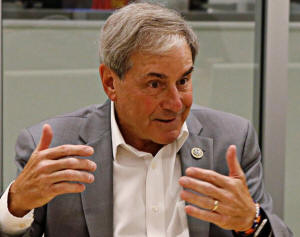|
As debt limit looms, House leaders eye
bipartisan deal
 Send a link to a friend
Send a link to a friend
 [June 24, 2017]
By Ginger Gibson and Amanda Becker [June 24, 2017]
By Ginger Gibson and Amanda Becker
WASHINGTON (Reuters) - Congressional
leaders are quietly working on a bipartisan deal to raise the U.S. debt
ceiling within weeks, hoping to prevent the difficult debt issue from
snarling a budget fight to come in September, a senior Democratic budget
writer said on Friday.
John Yarmuth, top Democrat on the U.S. House of Representatives Budget
Committee, told Reuters there is bipartisan interest in raising the debt
limit before August.
"There is talk going on, there is leadership conversation about this,"
said Yarmuth, who added that House Democrats do not plan to demand
concessions from Republicans in exchange for supporting a debt limit
increase.
Unlike most countries, the U.S. government has a statutory limit on how
much money it can borrow to cover the budget deficit that results from
Washington spending more than it collects in taxes. Only Congress can
raise that limit.

The Trump administration has warned the debt limit will need to be
raised in the fall. Treasury Secretary Steven Mnuchin last month moved
the target deadline for action to September from October, saying tax
receipts are coming in slower than expected.
Senate Republicans remain in contact with the administration on the
issue, but don't have further updates on their plans, a senior aide
said.
House Democratic leader Nancy Pelosi has said Democrats will support a
"clean" debt-limit bill, free of conditions. Conservative Republicans in
the House Freedom Caucus have traditionally voted against clean
increases and have already indicated they would like to raise the debt
limit less than requested by the Trump administration.
Congress's agenda is crowded, with healthcare legislation pending and a
deal needed by late September on funding the government. Raising the
debt limit adds another obligation.
[to top of second column] |

House Budget Committee ranking member John Yarmuth (D-KY) speaks
during an interview with Reuters in Washington, U.S., June 23, 2017.
REUTERS/Stelios Varias

Over the past decade, raising the limit went from a routine job to a
politically charged negotiation. In 2011, under former Democratic
President Barack Obama, Republicans began demanding concessions in
exchange for their votes to raise the limit.
As a result, the nation twice went to the brink of busting the debt
ceiling before an agreement could be reached.
Yarmuth said Democrats are not opposed to attaching a debt ceiling
increase to "bipartisan" legislation, but warned against adding
"poison pills."
“I don't think our side wants to play games with this,” he said.
Bipartisan discussions in the Senate on the debt limit have not
begun, a leadership aide confirmed.
Senate Democratic leader Chuck Schumer told reporters earlier this
week that the responsibility for raising the limit lies with
Republicans and warned against tying the debt limit to
deficit-creating tax cuts for the rich.
(Reporting by Ginger Gibson and Amanda Becker; Additional reporting
by Richard Cowan; Editing by Kevin Drawbaugh and Andrea Ricci)
[© 2017 Thomson Reuters. All rights
reserved.]
Copyright 2017 Reuters. All rights reserved. This material may not be published,
broadcast, rewritten or redistributed.

 |